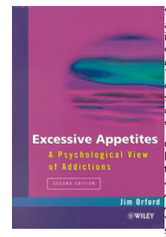"Gamble, gamble, gamble your life away… you might as well have put the money down the drain… you’ve got to face the truth that you’re having a love affair, and it’s with a machine whose lights flash, takes your money and kills your soul." (A ‘fruit machine addict’ cited in Orford, 2001).
Self-described as an "up-to-date and authoritative account of core knowledge in the [addictions] field," the second edition of Jim Orford’s now classic Excessive Appetites: A Psychological View of Addictions, is laden with reports of the most recent explorations of several addictive disorders including drinking, gambling, drug taking, eating, exercising, and sex.
One of Orford’s primary goals for this book is to develop a coherent picture of the state of current psychological accounts of addiction. Excessive Appetites: A Psychological View of Addictions does so by describing current views and scientific research on substance and non-substance related
addictive disorders. Orford discusses the development of these disorders and explores how people overcome addictive disorders.
 Excessive Appetites is filled with vivid and engaging quotes from individuals with addictive disorders. In a poignant manner, this intermingling of research with first hand accounts of grappling with addiction locates the reviewed addiction-research firmly within the context of the human dilemma and avoids discussing this issue in an antiseptic manner.
Excessive Appetites is filled with vivid and engaging quotes from individuals with addictive disorders. In a poignant manner, this intermingling of research with first hand accounts of grappling with addiction locates the reviewed addiction-research firmly within the context of the human dilemma and avoids discussing this issue in an antiseptic manner.
The book treats pathological gambling, specifically, as an incredibly important disorder to understand if we are to comprehend the addictions in general. Orford was among the first to recognize that addiction is not simply a property of drugs, but rather something more complex-and much more interesting. To help us develop an improved understanding of addictive behaviors, Orford develops a "Social-Behavioral-Cognitive-Moral Model" of addiction. The essentials of this model are not newly developed in this edition since much of this work had been built for the first edition.
Overall, Orford’s Excessive Appetites makes a significant contribution to the addiction literature. Those seeking a completely novel examination of psychological interpretations of addictive behaviors might not be completely satisfied with the second edition of Excessive Appetites: A Psychological View of Addictions, since, as Orford notes himself, many of the core concepts in this edition are the same as in the first edition. Further, Excessive Appetites does not include adequate consideration of several important topics such as recent studies of the psychobiological effects of addictive behavior, comorbidity with mental disorders, and the relationship between addiction and socio-demographic characteristics. However, the current edition will satisfy those who seek a succinct, thoughtful and well-organized review of recent theoretical and empirical research on the development, mechanics, and alleviation of addictive disorders.
References
Orford, J. (2001). Excessive Appetites: A Psychological Review of Addictions, Second Edition. John Wiley & Sons, LTD: New York.
The WAGER is a public education project of the Division on Addictions at Harvard Medical
School. It is funded, in part, by the National Center for Responsible Gaming, the
Massachusetts Department of Public Health, the Addiction Technology Transfer Center of
New England, the Substance Abuse and Mental Health Services Administration, and the
Center for Substance Abuse Treatment.




